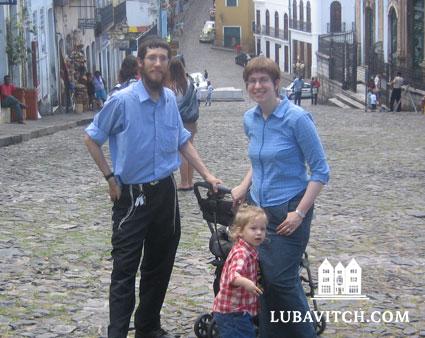Seeking sun, sand and samba lessons, 20,000 Israeli backpackers a year wind their way through the ancient ruins and beachside paradises of South America. For IDF soldiers, it’s a much needed relief from the stress of army service and the intensity of life on Israel’s borders.
“There is no doubt that the sabra outside of Israel is more interested in Yiddishkeit, but they are vulnerable,” says Rabbi Dovid Weitman, Chabad representative of Sao Paulo, Brazil, who supervised the opening of a new Chabad Center in Salvador, Bahia, Brazil. Indeed, on the morning of Rosh Hashanah, a group of scruffy Israelis cheered when they saw Bahia’s new Chabad representative, Rabbi Yisroel Bukiet emerge from his home. They had been looking for Chabad for an hour. If they hadn’t found it, they were going to try the Jewish-sounding place on the leaflet handed to them by the manager of their hostel. “Congregation Morasha” in Salvador sounds Jewish but it is a cult. Lonely and looking for company, an Israeli backpacker is also a soft target for assimilation, drugs and other vices.
With a new initiative by several South American philanthropists, Israeli backpackers will now have Chabad greeting them at five points on their South America itinerary. In addition to the one in Salvador, new Chabad centers have opened in Cusco, Peru; Buenos Aires and Bariloche, Argentina, with plans being finalized for one in La Paz, Bolivia. In the Far East, following the success of Chabad in Thailand, backpackers have added Chabad’s new centers in Ko Samui, Laos, and Ho Chi Minh City, Vietnam, to their route.
For years when Merkos L’inyonei Chinuch office at Lubavitch Headquarters sent young rabbinical students to these tourist traps, great crowds gathered. Merkos representatives to Cusco attracted 400 backpackers for Rosh Hashanah and 900 for the Seder. But it was a Seder for hundreds of Israeli backpackers in Bariloche that turned musings and maybes of permanent Chabad centers for Israeli backpackers into reality. Moved by the young Israelis’ warm response to Chabad’s Seder, the unnamed South American philanthropist approached Rabbi Tzvi Grunblatt, Chabad national director in Argentina. He and two other philanthropists created the core group funding the project.
Shortly before Rosh Hashanah, Rabbi Bukiet, his wife Rivky and their children, Betzalel, 2, and Chaya Mussia, 9 months, moved to Salvador. Two hours by plane from Sao Paulo, the Bukiets are hundreds of miles away from kosher food, Jewish schools, and a mikvah. With an ad in the newspaper and on Israeli travel websites, 58 Israelis, Argentines, Chileans, and South Africans sought the Chabad House for Rosh Hashanah services. Running prayer services for a motley crew that plunges in without warning demands a certain know-how. Rabbi Bukiet trained for several months with the granddaddy of all backpacker Chabad centers, Chabad of Thailand.
Rabbi Grunblatt and Rabbi Weitman turned to Chabad of Thailand’s Rabbi Yosef C. Kantor for pointers. “We know the work of Rabbi Kantor for years, and we understand the best thing is to learn from their experiences,” said Rabbi Grunblatt. Rabbi Kantor divulged three key features a Chabad center must possess to meet the needs of Israeli backpackers: a restaurant with hot food, an Internet café, and a Jewish library with Hebrew books.
With these Chabad centers situated along well-traveled trekkers’ routes, the potentially perilous experience could be entirely different. Backpackers who wind through Peru, Brazil, Boliva and Argentina and spend Shabbat at each Chabad, “already have five Shabbat weekends covered. They are starting to have a taste for Yiddiskheit,” said Rabbi Grunblatt.
In time, the impact can be even more far reaching. Backpackers return to Israel with warm memories of Chabad centers in the Far East and in South America and with their Jewish identity strengthened. “They will be good ambassadors when they come back with a positive view of Torah and mitzvot,” said Rabbi Weitman. “We think it will change the whole State.”

Be the first to write a comment.